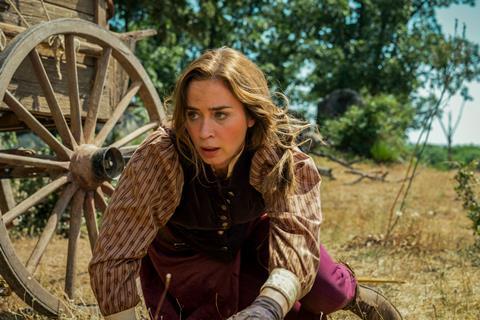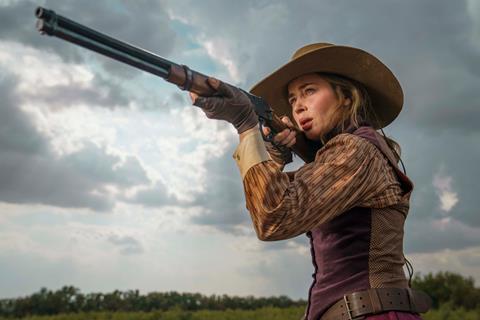Emily Blunt speaks to Screen about her dual roles as a ‘female Clint Eastwood’ and executive producer of Hugo Blick’s revenge western The English.

When writer/director Hugo Blick sent the first script for his six-part western The English to Emily Blunt, it came with the offer to not only star as English heiress Lady Cornelia Locke, but to executive produce. “It was the first time someone had come to me straight off the bat, with an offer of an EP and to build this with them, which was wonderful and inviting,” recalls Blunt. “He’s such a rare bird of a writer. I hadn’t read anything like it with the kind of poetry and yet spareness. It was completely intoxicating, confident and unpredictable.”
So much so that Blunt said yes after reading just two pages. “Which doesn’t usually happen. I would say within the first 20 I might be gripped by something, and want to keep reading, but it was her opening monologue, talking about the past and this relationship between her and a Native American. The way [Hugo is] able to Trojan horse history into a chase thriller without it being a lecture was so clever, aching and beautiful. I’m such a sucker for a big sweeping romance. I remember reading right up until Ciaran Hinds’ character knocks me out. Which I never saw coming. It was so violent and brutal. I just thought, ‘Oh my God. How is she going to get herself out of this?’”
Mythic landscape
Blunt’s Cornelia, who arrives in the American West of 1890 with revenge on her mind, is helped on her quest by Eli Whipp, ex-cavalry scout and member of the Pawnee Nation played by Chaske Spencer (known for The Twilight Saga). The reasons for her retribution are kept from the audience until the final episode but Blick, whose previous work includes The Shadow Line and The Honourable Woman, shared them with Blunt after she said yes. “Once we spoke, he told me where she was heading. I love a character with a secret; the unfurling of the onion is always fun to play. When it’s revealed, it’s shocking.”
Moreover, London-born Blunt, whose film credits include Sicario, A Quiet Place and Mary Poppins Returns, had always wanted to make a western. “There’s a nostalgic air to why I love a western,” she explains. “My mum showed me Shane and I remember being devastated. My dad showed me Unforgiven. I watched Hombre, The Good, The Bad And The Ugly and Giant. I adored that mythic landscape and the loneliness of the landscape. Usually it’s a very masculine world and, clearly, we see Cornelia walk into a toxic, masculine world. But she is Clint Eastwood, and [Eli] is Paul Newman, who just happens to be Native American. So this did feel like it was breaking the mould of the western, and a reimagining in some way.”
The English also marked Blunt’s first experience of long-form storytelling, an arena she had been interested in for a while. “The best material is on television usually, and you are not contorting something to hit an opening weekend. There’s a grace in letting things unfold with a bit of ease. And you can go on a real journey with these characters.”

With Blunt on board, Blick and his leading lady found a home for their show quickly, with Amazon Studios and the BBC coming on board. “We had some wonderful meetings,” Blunt recalls. “Amazon and one other place came in with the most fervour for it, but Amazon was very passionate. They wanted to buy it in the room. Hugo, ’cos he is so verbose and brilliant, blows people’s minds when he talks. It was an easy sell.”
Blunt has been involved in the producing side of filmmaking for a while, albeit without any on-screen credit. “I’ve helped rewrite scenes and third-act structures and whatever people want to use me for,” she reveals. “I’ve always done it and never wanted or needed the credit. But this was wonderful not to have to do the dance of, ‘Are you open to thoughts?’ You’re allowed thoughts at every turn. Hugo, of any writer I’ve worked with, needs the least notes imaginable. We were true partners in clarifying things. He’s so elliptical how he writes that sometimes I would say, ‘This needs to happen and we need to know where this is heading’. But those moments are few.”
Outside of writing and acting, Blunt reveals that post-production — editing, music, even colour timing — is also an area of joy. “When I’m acting, I tend to not feel like a producer presence. But I was very active in the edit. Hugo would send me cuts; we would talk and exchange notes.
“I’m a patient person and I like the patience of building something slowly,” Blunt continues. “I love that it’s not an immediate birth of something perfect. It takes work and detail and focus, and it makes me even more proud when something has been with me since its embryonic stages. I was far more nervous about The English coming out than anything else I’d done, because it was our baby. It was very precious to me — I’d lived with it for so long. Two years of thinking about her before I played her. Two years it had dwelled in my body.”
In the pipeline
Since The English, Blunt has been slowly developing several projects to produce. “At the moment, my production company is me, so I’m keeping it intimate!” She has optioned a Claire Keegan short story that Irish playwright Conor McPherson is adapting, and is also working on a film about Kate Warne, the first female detective in the US, with Amazon Studios and Seven Bucks.
Not that she will be disappearing from our screens anytime soon. While Blunt is taking the rest of 2023 off to be with her daughters “non‑stop”, she has David Yates’ Pain Hustlers, which she also produced, out later this year, set against the backdrop of the opioid crisis. “It’s about this single mother pulled into the intoxicating world of selling pharmaceuticals. It’s the idea of how long are you willing to dance with the devil for the sake of money and a brighter future?”
In February she wrapped Bullet Train director David Leitch’s reboot of TV’s The Fall Guy, co-starring Ryan Gosling. “I love David Leitch,” says Blunt. “His films are so kinetic, stylish and exciting, and this is hilarious. It’s a love letter to stunt men and making movies. They are one of the only departments not recognised at the Oscars, which is absurd. I hope that changes. The film breaks records for practical stunts that I’m so excited for people to see.”
Before then, however, there is the matter of Christopher Nolan’s Oppenheimer, in which she plays the wife of Cillian Murphy’s atomic-bomb maker — an experience she describes as “a bit of a life-changer, a run-to-work job and a true masterclass”.
“He is all restrained down in his terribly British way but is a hurricane of a talent,” she adds of Nolan. “It felt like old-school movie-making, that Los Alamos set in the middle of the New Mexico desert was astonishing. Cillian and I, we’d worked together on A Quiet Place Part II, so we had a shorthand. They were a fiery pair, the Oppenheimers. She was his intellectual equal in many ways. Not an easy woman. They both loved a drink. It’s such an experience. It’s not like watching a film.”
One project that looks less likely as the years tick by is a sequel to Doug Liman’s 2014 sci-fi action film Edge Of Tomorrow, in which she co-starred with Tom Cruise. A modest hit theatrically, it has since built up a sizeable fan-following on home media. “I would love it,” enthuses Blunt, who also has a potential Jungle Cruise sequel and another “extraordinary” Blick project on the cards. “You’ve got to talk to Tom Cruise. But it’s about the story, and how do we top the first one? It’s got to be about people’s appetite for it. And whether we want to put on those fucking suits again.”






![The Brightest SunScreen[Courtesy HKIFF]](https://d1nslcd7m2225b.cloudfront.net/Pictures/274x183/3/5/0/1448350_thebrightestsunscreencourtesyhkiff_312678.jpg)


















No comments yet